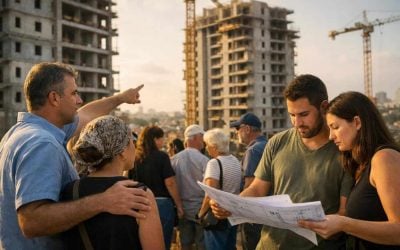Residential Market Developments
Rising Housing Inventory Levels
Israel’s housing market is experiencing an unprecedented surplus of newly built apartments. Recent data from the National Statistics Authority indicates approximately 81,000 unsold residential units nationwide as of early 2025, creating about 19 months of inventory—meaning it could take nearly two years to sell all existing homes at the current sales rate. This oversupply is especially prominent in major urban areas, such as Tel Aviv and Jerusalem, where approximately 9,200 and 7,500 unsold units respectively are contributing significantly to the glut.
Changing Buyer Trends
Mortgage rates have significantly increased, driving monthly payments on home purchases about 30% higher than equivalent monthly rental costs—a dramatic shift from previous trends. Historically, buying was often more affordable than renting, but today’s high-interest environment has turned that upside down. Consequently, more Israelis now prefer renting, prompting the government to explore new policies aimed at expanding long-term rental housing and reducing financial burdens on families.
New Urban Renewal Efforts
Despite slowing home sales, real estate development activity continues, particularly in northern regions. Cities such as Haifa Bay suburbs and Upper Nazareth have embarked on extensive urban regeneration initiatives, recently starting projects that will add roughly 4,600 apartments. These developments aim to revitalize outdated neighborhoods and provide more affordable housing alternatives away from congested central cities.
Tel Aviv’s Paradox
Tel Aviv continues to reflect an unusual contradiction: it is both Israel’s leader in new apartment sales, recently seeing over 900 units sold between November and January, and the city with the highest number of unsold units. This indicates strong demand but simultaneously highlights challenges developers face selling off substantial inventory.
Commercial Market Trends
Retail Sector Revival
Retail real estate has shown impressive resilience, exemplified by the recent inauguration of “BIG Style Center” near Herzliya. Over its opening weekend, the shopping destination attracted over 160,000 visitors, underscoring pent-up consumer demand post-pandemic. Conversely, malls located farther from city centers, like the large-scale D-Mall near Jerusalem, have faced difficulties maintaining consistent traffic, relying heavily on events to sustain businesses.
Office Market Slowdown
The office market, particularly in Tel Aviv’s tech-focused areas such as Ramat HaHayal, continues to experience softness, marked by elevated vacancy rates. However, signs of stabilization are emerging. Recently, shared workspace providers expanded significantly, leasing around 4,200 square meters in central Tel Aviv. Still, landlords continue to offer flexible leases and incentives to attract tenants amid the broader slowdown.
Housing Prices and Affordability
Continued Price Growth
Nationally, home prices increased approximately 8% from early 2024 to early 2025, with Tel Aviv experiencing the highest district-level growth of about 10.6%. Areas in southern Israel saw more modest growth, around 5%. Despite a significant inventory surplus, persistent demographic growth, particularly in northern cities and Jerusalem, continues pushing prices upward.
Rising Rental Demand
Rental market pressures intensified due to decreased affordability of purchasing homes. Nationwide, rental prices have risen around 6% over the past year. Approximately 30% of households now rent their homes, a share expected to rise further. Government initiatives aim to incentivize developers to invest in rental-specific housing to alleviate pressure.
Increasing Construction Costs
A substantial increase in construction costs is also impacting housing affordability. The Construction Inputs Index rose by approximately 6.5% year-over-year due to labor shortages and higher material prices. Restrictions on Palestinian construction workers, in place since late 2023, have significantly contributed to the labor cost hike.
Notable Real Estate Transactions
Major Tel Aviv Land Deal
Cybersecurity leader Check Point and real estate developer Israel Canada are finalizing a major transaction to purchase 13,500 square meters in Tel Aviv’s Bitzaron neighborhood, valued around NIS 825 million ($225 million). The area, previously owned by the Israel Electric Corporation, is designated for a mixed-use complex including offices, retail, and residential units.
Retail Acquisition Moves
Institutional investors are showing strong interest in established malls. Notably, Aspen Group is negotiating the acquisition of a 27% stake in a central shopping mall in Rishon LeZion from developers Yigal and Moshe Gindi. This potential transaction illustrates sustained investor confidence in brick-and-mortar retail properties.
Infrastructure Impact on Real Estate
Transit Infrastructure Boosts Values
The newly operational Tel Aviv Metro Red Line is significantly increasing real estate values along its route, from Petah Tikva to Bat Yam. Properties within walking distance of metro stations have appreciated notably higher than other areas. This “transit premium” aligns with global trends, supporting denser urban development near transit hubs.
Broader Infrastructure Expansion
Israel’s ongoing expansion of its transportation network, including future metro lines in Tel Aviv and expanded light rail in Jerusalem, is already positively impacting land prices. Upcoming commuter rails, such as the Haifa-Nazareth line, could soon accelerate development in previously peripheral regions.
Government Policy Changes
Tax Adjustments
As of early 2025, the VAT rate on new home purchases increased to 18%, raising overall housing costs. Additionally, inflation-adjusted thresholds for property taxes are frozen until 2027, indirectly increasing taxes as property values climb.
Central Bank Lending Restrictions
The Bank of Israel introduced tighter regulations on developer-offered financing plans, such as low down payments or delayed repayments, to avoid risky lending practices. This move aims to ensure long-term market stability.
Affordable Housing Initiatives
A notable policy launched this year provides discounted housing plots to minority IDF veterans in northern and southern regions, aiming to support communities historically underserved by housing initiatives. Additionally, plans to significantly expand long-term rental housing are underway, with targeted incentives for developers.
Regulatory Reforms
Stricter regulations for real estate agents, effective this month, mandate transparency and prohibit undisclosed fees, aligning Israel’s industry standards with international best practices.
Market Outlook and Expert Opinions
Real estate experts predict continued price growth throughout 2025, though at varied rates. While some analysts forecast a robust recovery with double-digit increases driven by post-war buyer demand, others expect moderate price rises of around 5-7%, tempered by high mortgage rates and affordability constraints.
Foreign investment interest remains strong, fueled by a weaker shekel and geopolitical factors prompting diaspora Jews to invest in Israeli properties, especially in Jerusalem and surrounding modern suburbs.
Overall, Israel’s real estate market in 2025 is navigating a delicate balance of substantial opportunities and ongoing challenges, reflecting optimism tempered with cautious market dynamics.




